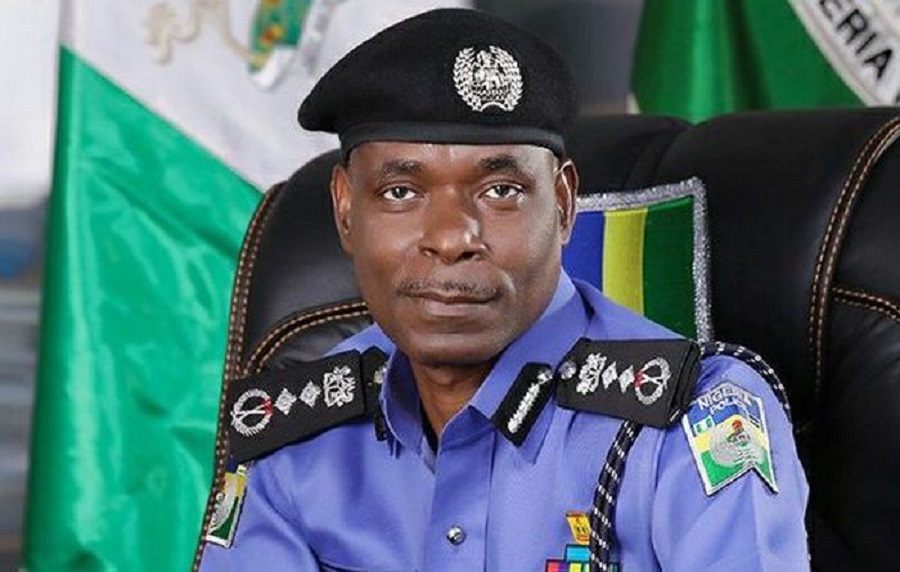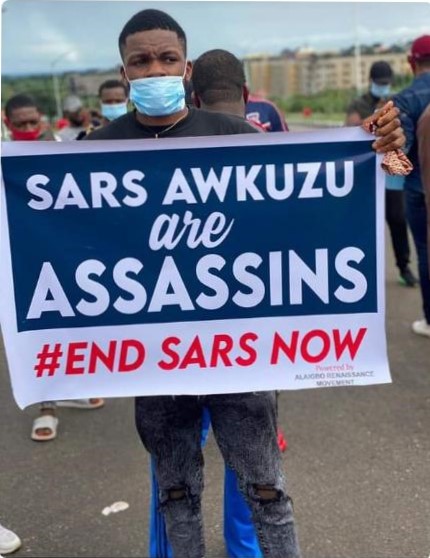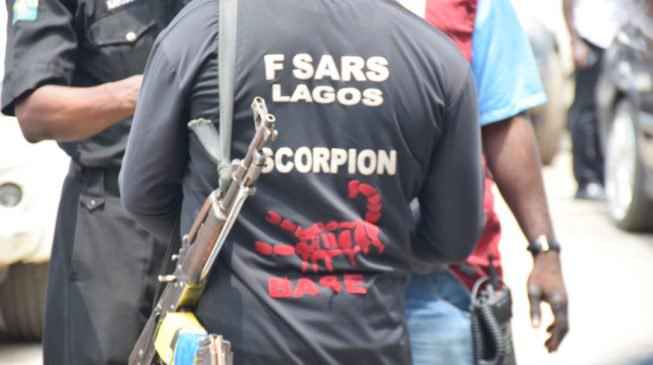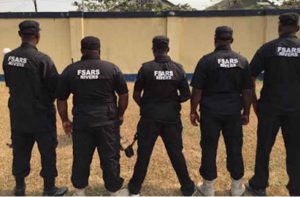DPA Seeks to Extend Protest to Complete Reform of Nigeria’s Criminal Justice System
9 min read
Special Report by DPA, Presented by Dr. Johnson Greg, 12th October, 2020.
The Due Process Advocates Foundation (DPA) has issued a report seeking to extend the ongoing anti-SARS protest to full scale reform of the justice system. The organization whose Founder, Emeka Ugwuonye, was falsely charged with murder by the Nigerian police in retaliation for his relentless criticism of Nigerian police, seeks to ensure that the problem of the Nigerian police can now be addressed in a substantive and enduring manner. The group published its position in the following report made available to the media today.
Disbanding SARS Only A First Step In The Necessary Reform of Nigeria’s Criminal Justice System.
Less than a week after the Nigerian police headquarters informed Nigerians that it was impossible to disband its SARS unit, the Inspector General of Police (IGP) announced that SARS has been dissolved with immediate effect. In the interest of uninterrupted progress, we shall not probe the mindset that caused such doublespeak by the police high command. We shall not ask why such false notion that SARS is indispensable or so important had persisted for so long. The equivocation and hesitation of the IGP in shutting down SARS indicated that the police high command were aware of the atrocities and crimes against humanity committed by SARS officers, and were indeed complicit in those crimes.
The most important thing now is how Nigerians can move forward in the right direction with the development signaled by the disbandment of SARS. The next step should be accountability. The world must demand for accountability. The SARS officers who committed serious crimes must be identified and prosecuted. Otherwise what the IGP has done by the disbandment will amount to an amnesty or immunity or cover for officers with blood of the innocent in their hands. Note that the SARS commanders and officers in places like Lagos, Abuja, Anambra (Awkuzu) and Port Harcourt are already well known. Their victims are also known. As happened to the SS officers in Germany in 1945, the SARS officers must identified, tracked down and brought to justice. The true extent of the atrocities by SARS officers must be revealed. Anything short of that will portray the IGP as more interested in protecting the guilty police officers.
The question is whether we can trust the police to play any leading role in any investigation to this effect, given the widespread complicity of many officers all the way up the chain of command. The disbandment of SARS must necessarily be followed up with a compressive reform of the Nigerian police force. Disbanding the SARS unit is only a symbolic gesture. What is even more important is to ban the operational methods and technics used by SARS officers as well as the standards of accountability within the force. It was what the SARS officers did and how they did it that was the real problem, and not the name “SARS”, per se. What Nigeria needs to ban are what these officers did and how they did them.

HOW THE SARS OFFICERS OPERATED AND WHAT THEY DID:
1. Because there is no criminal background check before hiring policemen, many hardened criminals are able to join the Nigerian police force and make it to the SARS unit or other killer squads in the police force.
2. Because there is no mental health background check before hiring policemen, psychopaths and other mentally sick people join the Nigerian police force and make it to the SARS unit or other killer squads in the police force.
3. Because nearly every new recruit into the Nigerian police force pays bribe in order to be recruited, criminals and mentally sick people have the greatest motives and incentives to join the Nigerian police force and they make it to the SARS unit or other killer squads in the police force.
4. SARS officers are poorly educated or trained in modern policing. Hence, they are ultra superstitious. They are cult members. They use juju as part of their weapons. They engage in blood rituals.
5. SARS officers are probably the most deadly, most bloody and the most disguised crime gang in Nigeria. Even the IGP is afraid of them. Hence the IGP will support them behind the press, rather than ban them.
6. SARS officers regularly commit the following crimes: armed robbery, kidnapping, rape, extrajudicial killing, ritual killing, extortion, torture, disappearing of people, stealing properties of suspects, falsely arresting people in order to steal their properties while detaining such people, obtaining forced confessions, probably harvesting and trading in human body parts, witness tampering, witness intimidation, blackmailing of judges, lawyers and witnesses, planting of evidence, destruction of evidence, obstruction of justice, use of threats of violence and intimidation, selling of weapons to criminals, racketeering and criminal conspiracy, and other atrocities.
NOTES: How did some SARS officers end up owning car dealerships and car stands? They stole the vehicles of their suspects. In fact, many a times, SARS officers who want to steal your property will accuse you or armed robbery just in order to steal your property. Then, they may go further and kill you extrajudicially just to cover up their crime.
7. Only less than half of the SARS suspects were arrested directly by SARS officers themselves. What normally happens is that the regular police unit will carry out a raid and randomly arrest a number of people. They will take these people to their station and ask them to bail themselves with money. Those who are not able to pay to bail themselves will be handed over to SARS. They are then tagged armed robbers. SARS officers will torture them until they confess to any robbery they want them to confess to.
8. SARS are responsible for extrajudicial killings of average of 2000 Nigerians every year for the past 20 years. And no SARS officer has been prosecuted for these atrocities. So, every SARS officer understands or believes that he is above the law.
9. SARS officers will torture you until you confess to armed robbery that you knew nothing about. With the confession, they feel they can either steal your property or extort money from your relatives. And to cover the whole thing up, they either kill you or charge you to court for armed robbery, knowing you would be remanded in prison pending a trial that would take six years or more to conclude.
10. SARS officers detain suspects for up to two years without charging them to court. During that period, they extort money and other valuables from relatives of the suspects, including sex from wives and relatives of suspects in exchange for promises to release the suspects. And if a suspect is lucky to be charged to court, SARS officers, who will act as witnesses do everything to delay trial.
CRITICAL OBSERVATION:
Officers of other police units such as the Intelligence Response Team (IRT), the Special Tactical Squad (STS), the Anti-Cultism Squad, the Anti-Kidnapping Squad, etc adopt similar methods and commit similar atrocities as SARS officers. Beyond the Nigerian police force, other law enforcement agencies, example the EFCC, engage in intimidation, extortion, blackmailing of witnesses and even judges.
EXTENDING IT BEYOND POLICE REFORM TO THE REFORM OF THE JUSTICE SYSTEM
One thing should be clear to all. The atrocities and crimes committed by SARS officers and officers of other police units all the way to other law enforcement agencies in Nigeria would not be possible if other branches of the police force and the judiciary had performed their constitutional duties. On the contrary, studies have shown that other units of the police, the office of the Attorney General and the courts have either been complicit or aided the criminal elements in these police units.
Let us have a simple illustration of how SARS would normally process a case, thus:

ILLUSTRATION:
SARS officers arrest five people, presumably innocent people. They torture them and force them to confess and in the process kill two of them. The police officers close to the Police Commissioner and the Police Public Relations Officer (PPRO), knowing exactly what happened, will parade the three surviving suspects and misinform the public by claiming that only three suspects were arrested while two are at large or that five suspects were arrested but two died of natural causes. The Commissioner and the PPRO will state that the suspects gave voluntary confession, even when they are aware that those confessions were obtained through extreme torture. They would deny these suspect access to lawyers and family until they have been forced to confess and are paraded.
This pattern of cover up continues. Officers in the police legal department would use these confessions known to them to have been coerced to frame and fabricate many charges against these innocent people. Often, the only reason the officers in the legal department would be charging the suspects to court is because they knew that if released the suspects would reveal how two of them were tortured to death. To stop them from revealing all that, the officers in the legal department would indict them with highest offences in the law book, being aware that the judges would remand them in prison for years awaiting trial.
This coordinated abuse continues: The three suspects are arraigned before a judge. The charging documents suggest that two suspects are still at large or that they died of natural causes. The defendants tell the court that they were tortured and detained for two years before arraignment. The judge refuses to consider these allegations of police brutality. And in order to cover those atrocities, the judge turns down any attempt to expose the illegal manner in which the suspects were treated leading to their arraignment. Further, the judge fails to examine the proof of evidence tendered in the case, which would have revealed that the charges are trumped up.
Then the judge denies bail and remands these defendants in prison where they would stay for the next six years or more that it would take to conclude trial. By remanding them, the defendants are denied adequate opportunity to defend themselves. This will lead to denial of fair trial and wrongful conviction. In many cases, after being remanded for many years awaiting trial, the judge will discharge or acquit the defendants without compensation.
We can vary the above scenario by adding the fact that SARS officers will take a truck to the house or shop of any person they arrested and cart away his properties or goods, which are promptly shared among the officers and their commanders. During the trial, the judge is made aware of this but he refuses to look into it. Properties taken away from the suspect during arrest must be exhibits and should be in the custody of the court, and if not exhibits they should be ordered released. But the judges aid the police atrocities by simply failing to do their duties.

We can further vary the above scenario by stating cases in which a team of regular police officers will raid any neighborhood, usually poor neighborhoods, and arrest anyone they see. They will take them to their station and ask them to bail themselves or call their families to bail them with certain amount of money, which is lowered as time goes on. Most of those arrested will eventually manage to be bailed. But the few who are not able to get someone to bail them will be sent to SARS as punishment for not paying. Upon getting to SARS, they will be tortured and forced o confess to any unsolved armed robbery case. This is how they end up having casemates who never knew themselves until they met in the police cell.
CONCLUSION
Disbandment of SARS will not serve the interest of Nigerian unless it leads to compressive reform of the police force, the entire law enforcement agencies, and the criminal justice system. We must require that every agency involved in the administration of criminal justice must play its part. The courts must enforce the constitutional provisions as to liberty and fair hearing vigorously to prevent the SARS-like atrocities. The correctional service must document and report whenever a torture victim is remanded in its facilities. The Due Process Advocates (DPA) Foundation recommends and demands for this as the only legitimate goal to pursue out of the ongoing ENDSARS protest.

